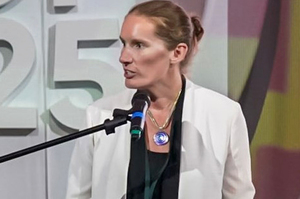
Valerie Hickey is Global Director for Environment, Natural Resources and the Blue Economy at the World Bank. Valerie’s job lies at the intersection of development, climate and nature. She tries to use natural capital to unlock a path out of poverty in countries around the world. Her work also focuses on ensuring that environments are green, clean, and resilient enough to keep people out of poverty, especially in places where climate change and environmental degradation multiply the fragility, conflict, and violence that already make poverty more likely.
Valerie stepped into this role after a period as Manager for Advisory and Operations in the World Bank's Climate Change Group, where she oversaw the implementation of the World Bank’s corporate commitments on climate change, including tracking and reporting on climate mainstreaming and climate finance.
Growing up in Ireland in the ‘80s and ‘90s, Valerie had a first-person view of division and conflict.
“We weren't allowed to talk about politics because that would invite all sorts of problems,” she recalls.
Valerie wanted to better understand the reasons behind the entrenched conflict and ongoing violence in her home country, so she chose to study political science, but this didn’t feel like enough.
“I realized that I needed to do more,” she said. “I wanted to understand how to make peace in an affirmative way.”
This is what drew Valerie to the Kroc Institute and its Master’s in International Peace Studies. She enrolled in fall 1999 and found the program to be a space for robust engagement around many of the questions she had been asking about environmental justice, poverty, and conflict.
“In our program, we got to practice what we were learning every day,” she says.
Her studies allowed her to experience conflict resolution in a practical sense through living in community with her diverse classmates.
“All fellows lived together in ‘Peace House,’ and it was a wonderful feeling of belonging to a group with disparate interests around which we still found a way to imagine a common future,” Valerie said.
After graduation, Valerie joined the World Wildlife Fund, where she began looking specifically at environmental conflict, and she followed this role with a stint at another international NGO, the Wildlife Conservation Society. In these roles she focused on integrating conservation and development.
When offered the opportunity to work at the World Bank, Valerie was hesitant due to (mis)perceptions around its environmental record, but took the opportunity and found an institution full of incredibly smart and passionate people driven to end poverty.
She soon realized that to be effective she needed to become bilingual in both peace studies and natural sciences. After earning a Ph.D. in environmental science and policy from Duke University in 2009, she returned to the World Bank, where she finds it rewarding to work at the system level to influence policies in environmental justice and poverty alleviation.
Until recently Valerie served as the World Bank’s Practice Manager for Environment, Natural Resources and Blue Economy in Latin America and the Caribbean where she oversaw around $2 billion of investment across Latin America and the Caribbean, focused on everything from fisheries to forestry. Her work supporting communities on issues of climate change, sustainability, pollution and environmental health is built around the four pillars of land-use planning, natural capital protection, business diversification, and benefits sharing.
Throughout her career, Valerie has been trying to make sure that her work puts people at the center, doing good for the environment and delivering tangible benefits for local people. She especially wants to help reduce the environmental burden on Indigenous communities who tend to be the least responsible for climate change, but bear a large share of its consequences.
“There's a paradox in having the richest natural capital coexist with some of the poorest people. We asked them to protect the forests when everybody else has been cutting them down,” she says. “I think it is enormously important that we use nature sustainably to build pathways out of poverty that are green, resilient, and inclusive.”
Valerie sees a growing connection between peace and environment because of potential climate migration and the instability that may come out of it.
“Most of us want to stay where we live, but to do that, we have to be able to find a living from the land and be safe and secure,” she explains, “That's where the environment comes in again either as a source of opportunity or as a threat multiplier that exacerbates fragility and conflict.”
In Fall 2022, Valerie returned to the Notre Dame campus to receive the Kroc Institute's Distinguished Alumni Award and present the lecture, "The Multiplier Effects of the Triple Environment Crises on International Peace and Development."